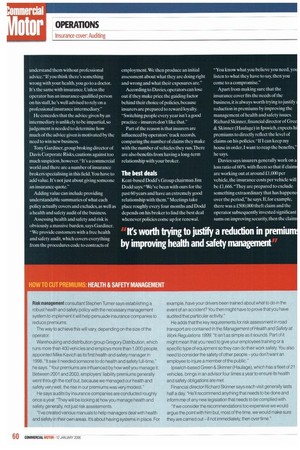HOW TO CUT PREMIUMS. HEALTH & SAFETY MANAGEMENT Risk management
Page 60

If you've noticed an error in this article please click here to report it so we can fix it.
consultant Stephen Turner says establishing a robust health and safety policy with the necessary management system to impIernent it will help persuade insurance companies to reduce premiums.
The way to achieve this will vary, depending on the size of the operator.
Warehousing and distribution group Gregory Distribution, which runs more than 400 vehicles and employs more than 1,000 people, appointed Mike Kavich as its first health and safety manager in 1998. "It saw it needed someone to do health and safety full-time," he says. Your premiums are influenced by how well you manage it. Between 2001 and 2003, employers' liability premiums generally went through the roof but, because we managed our health and safety very well, the rise in our premiums was very modest."
He says audits by insurance companies are conducted roughly once a year. They will be looking at how you manage health and safety generally, not just risk assessments.
"I've created various manuals to help managers deal with health and safety in their own areas. It's about having systems in place. For example, have your drivers been trained about what to do in the event of an accident? You then might have to prove that you have audited that particular activity.'
He adds that the key requirements for risk assessment in road transport are contained in the Managementof Health and Safety at Work Regulations 1999. "It isn't as simple as it sounds. Part of it might mean that you need to give your employees training or a specific type of equipment so they can do their work safely. You also need to consider the safety of other people you don't want an employee to injure a member of the public."
Ipswich-based Green & Skinner (Haulage), which has a fleet of 21 vehicles, brings in an advisor four times a year to ensure its health and safety obligations are met.
Financial director Richard Skinner says each visit generally lasts half a day. "He'll recommend anything that needs to be done and inform me of any new legislation that needs to be complied with.
'If we consider the recommendations too expensive we would argue the point with him but, most of the time, we would make sure they are carried out if not immediately, then overtime."
























































































































































































